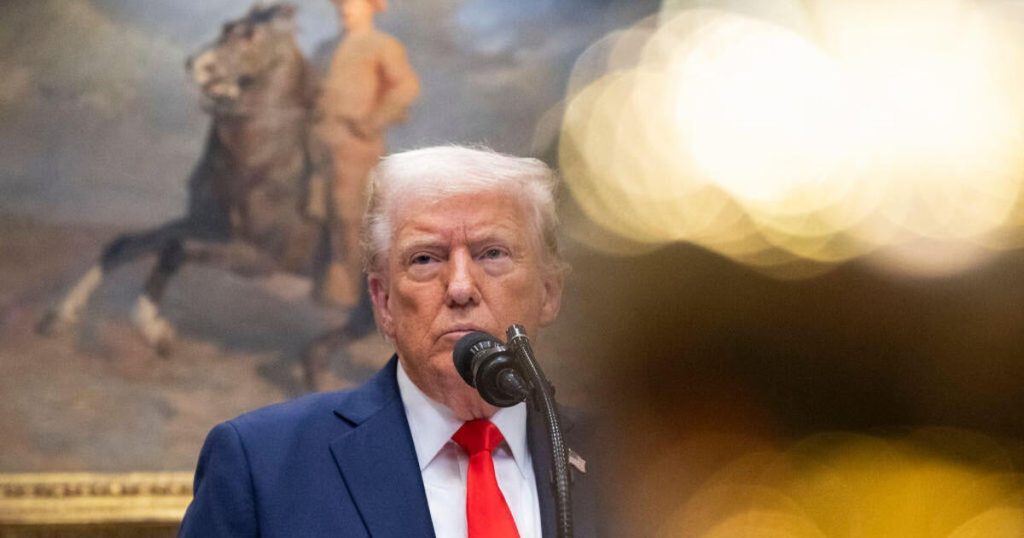In a strong move set to impact trade relations, President Trump announced on Monday his decision to implement a 25% tariff on nearly all goods imported from Mexico and Canada. The tariffs will take effect at 12:01 a.m. on Tuesday, just before the president’s scheduled joint address to Congress. Despite previous negotiations for a potential reprieve, Trump indicated that no further discussions would alter the impending tariffs, which he views as crucial to encouraging U.S. manufacturing and addressing border security issues.
| Article Subheadings |
|---|
| 1) Impending Tariff Implementation and Initial Reactions |
| 2) Rationale Behind the Tariffs |
| 3) Broader Trade Implications |
| 4) Industry and Economic Reactions |
| 5) Future Trade Relations with Canada and Mexico |
Impending Tariff Implementation and Initial Reactions
With tariffs set to take effect early Tuesday morning, President Trump’s strategy to impose significant tariffs on imports from Mexico and Canada has garnered immediate attention. At a press briefing, a reporter inquired whether the countries could negotiate an agreement prior to the deadline. Trump’s unequivocal response was, “No room left for Mexico or for Canada, no.” This decisive stance reflects his administration’s view that past negotiations have not yielded the necessary results to address his concerns. By introducing these tariffs right before his address to Congress, Trump is likely aiming to underscore his commitment to economic nationalism and border security policies.
Rationale Behind the Tariffs
Trump justified his aggressive tariff policy as a necessary tool to compel other nations to take more responsibility for issues he perceives as directly affecting the United States. He particularly pointed to concerns regarding illegal immigration and the influx of fentanyl across the borders, asserting that both Mexico and Canada have failed to adequately manage these challenges. As he stated, “The tariffs, they’re all set; they go into effect tomorrow.” This comment solidifies his belief that tariffs can serve as a “powerful weapon” to secure concessions from foreign governments and boost domestic manufacturing capabilities. This approach aims to bolster the U.S. economy while simultaneously addressing persistent border security concerns.
Broader Trade Implications
The announcement comes amid a complex backdrop of international trade and ongoing disputes concerning import tariffs, particularly with China. The Trump administration has previously threatened additional tariffs on Chinese imports, and the announcement of a 10% tariff on Chinese goods further underscores the administration’s hardline stance on trade policy. These tariffs are positioned as reciprocal measures against countries that impose their own tariffs on American goods. Such a cascading series of tariffs may have broader implications, affecting relationships not only with Mexico and Canada but also extending to other trade partners who could react by imposing their own tariffs in retaliation.
Industry and Economic Reactions
Economists and industry leaders have expressed significant concern regarding the potential fallout from the newly announced tariffs. They warn that the imposition of such tariffs could lead to higher prices for American consumers as companies pass on increased costs associated with imported goods. The financial markets reacted negatively to the news, with major U.S. indices seeing declines of approximately 2% on the trading day following the tariff announcement. This reaction highlights the uncertainty and concern among investors regarding the ripple effects of such trade policies on the economy, particularly as businesses brace for the additional costs associated with tariffs on steel, aluminum, and agricultural products.
Future Trade Relations with Canada and Mexico
The future of trade relations between the U.S., Canada, and Mexico now hangs in a precarious balance. Both Mexico’s President Claudia Sheinbaum and Canada’s Prime Minister Justin Trudeau had previously engaged with the Trump administration to avert these tariffs, promising to enhance security measures on their borders. However, with tariffs now activated, it may lead to a cooling of diplomatic relations as each side reassesses their negotiation strategies moving forward. The impact of these tariffs is not limited to immediate economic consequences but extends to larger geopolitical dynamics within North America, affecting cooperation on various fronts including trade, security, and environmental agreements.
| No. | Key Points |
|---|---|
| 1 | President Trump will impose a 25% tariff on goods from Mexico and Canada starting Tuesday. |
| 2 | Trump has expressed no further room for negotiation on these tariffs. |
| 3 | The tariffs are framed as necessary to address border security and drug trafficking issues. |
| 4 | Economic analysts warn of potential consumer price increases due to tariffs. |
| 5 | Future trade relations with Canada and Mexico are uncertain as tensions rise. |
Summary
The decision to enforce tariffs on imports from Mexico and Canada marks a new chapter in U.S. trade policy under President Trump. With an uncompromising approach to negotiations and a focus on domestic manufacturing and border security, Trump’s tariffs reflect a significant shift in how the administration views economic relationships with its trade partners. The potential economic implications, both domestically and internationally, represent a complex challenge for policymakers moving forward.
Frequently Asked Questions
Question: What are the main goods affected by the tariffs?
The 25% tariffs will be applied to nearly all goods imported from Mexico and Canada, which may include a wide range of products from manufacturing sectors to agricultural goods.
Question: Why did President Trump decide to impose these tariffs now?
Trump believes the tariffs are necessary due to what he views as inadequate handling of border security and drug trafficking by both Mexico and Canada, compelling them to take more responsibility.
Question: How might these tariffs affect U.S. consumers?
Economists warn that these tariffs could result in increased prices for American consumers as companies may pass on the higher costs of imported goods to their customers.


